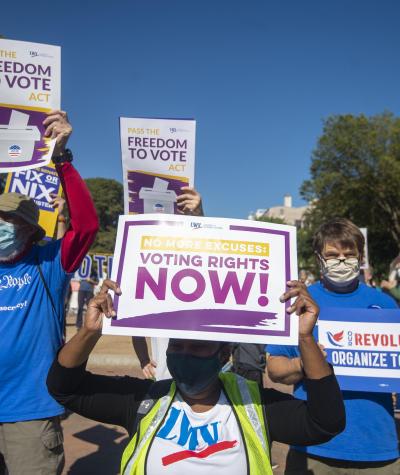Whatever our color, background or zip code, in America we value our freedom. The freedom to have a say in the key decisions that impact our lives — from health care to education to job creation.
To make our voices heard when our representatives decide on these matters, we need a democracy that works for and includes us all, but with less than a year until the 2022 midterm elections, our country faces a number of obstacles to achieving these goals.
Those obstacles include wealthy special interests and secret money groups dominating election spending, a Federal Election Commission (FEC) that consistently fails to hold bad actors accountable, restrictive election laws that prevent election workers and election administration officials from doing their jobs, and state lawmakers enacting legislation to create deliberate barriers to voting and drawing gerrymandered maps.
Since the Supreme Court’s 2010 ruling in Citizens United v. FEC, which allowed for corporate independent expenditures and paved the way for super PACs that could spend unlimited amounts on campaigns, special interest groups have used unlimited, secret spending to rig the political system in their favor.
Ahead of the 2022 midterms, Democratic and Republican super PACs have already spent millions to influence voters.
Additionally, since outside groups who don’t disclose their donors can contribute unlimited amounts to super PACs, there is often a lack of transparency about the true source of money used to influence our elections, undermining voters’ right to know who is spending big money to influence their vote.
Meanwhile, after the record high voter turnout during the 2020 election, state politicians who want to be able to pick their voters, instead of having voters pick their leaders, have continued to enact laws limiting Americans’ freedom to vote and impeding the ability of election workers and administrators to do their jobs.
Between Jan. 1, 2021 and Sept. 27, 2021, 19 states enacted 33 laws that decreased or hindered voting access, according to the Brennan Center for Justice. Several of these laws shift power away from or impose criminal penalties on election officials and make it harder for nonpartisan poll workers and election volunteers to assist voters.
While states are changing voting and election administration laws, they are also in the process of drawing the new district maps that will influence our communities and our lives for the next decade. According to RepresentUS, 35 states are at a high or extreme risk of gerrymandering this year, which would bar those states’ voters from having an equal say in their future.
To help combat gerrymandered maps, Campaign Legal Center (CLC) has a tool, PlanScore, that allows people see the partisan skew of proposed maps in their state and contextualize the gerrymandering that is occurring.
Our democracy is undeniably facing threats on multiple fronts, but there is a solution that would address all of this and more. The Freedom to Vote Act, currently before Congress, is a critical and transformative bill that would make the promise of democracy more real for us all through its comprehensive campaign finance, redistricting, voting access and election protection provisions.
The Freedom to Vote Act would increase accountability and reduce corruption by requiring disclosure when a group spends over $10,000 running ads that promote, attack, support or oppose a candidate, as well as incorporating a trace-back requirement that prevents the use of intermediary groups to conceal the true source of election spending.
To strengthen the FEC’s enforcement abilities, the Freedom to Vote Act also would extend the statute of limitations for violations of federal campaign finance law and make it easier for FEC investigations to move forward.
Currently, just half of the agency’s Commissioners are empowered to block an investigation from proceeding, but under the Freedom to Vote Act, a majority would be needed to do so.
To make sure that fair maps are created, the Freedom to Vote Act would explicitly prohibit partisan gerrymandering, meaning that states could not use redistricting plans drawn with either the intent or the effect of unfairly favoring or disfavoring any political party.
This legislation would also authorize legal claims against partisan gerrymandering, promote transparency and opportunities for public comment during the mapmaking process and expand protections for racial minority voters under the Voting Rights Act (VRA).
The Freedom to Vote Act also contains several provisions protecting the ability to vote early and by mail, as well as expanding opportunities for voter registration, ensuring that voters have equitable access to in-person polling places, increasing access for voters with disabilities and establishing stronger legal tools for protecting the right to vote.
Finally, this bill would make it a federal crime to intimidate, threaten or coerce an election official or election worker to impede or interfere with their performance of their official duties or retaliate against them for performing those duties.
As the 2022 midterm elections approach, we must prepare by addressing the issues that continue to plague our democracy. To do so, Congress must pass the Freedom to Vote Act. To move forward together, we must ensure that Americans can cast our ballots to elect leaders who govern in our interests and make the promise of our democracy real for all of us.

